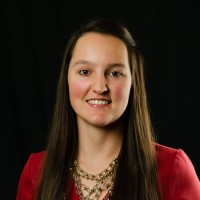Two Views: Online & On-Campus Perspectives of UA’s Eller College of Management
B-School Search
For the latest academic year, we have over 250 schools in our BSchools.org database and those that advertise with us are labeled “sponsor”. When you click on a sponsoring school or program, or fill out a form to request information from a sponsoring school, we may earn a commission. View our advertising disclosure for more details.
In the midst of packing, driving across the country, and moving into a new apartment I was able to do a ton of schoolwork on my smartphone and not fall behind in my classes.
Kortney Clements, Eller College of Management Alumna
Deciding to get your MBA is easy. On top of the professional education they obtain, graduates can quickly double their salaries—a boost that even holds true during a financial recession. The difficult part comes when deciding where to get your MBA. And, with the increasing quality and quantity of online programs, the original question is compounded with another: should you go for a traditional on-campus MBA or a more flexible online MBA?
The consensus used to be that those fresh out of undergraduate programs should go the on-campus route, and working professionals should look to the online programs. That has changed.
The flexibility of online MBA programs means that one can attend a top-ranked program on the other side of the country without having to uproot themselves, and on-campus programs offer full-time, part-time, and hybrid options. When the curriculum and the faculty are the same across both the online and on-campus modalities, students are no longer just looking for the best MBA program—they’re looking for the program that’s best for them.
Consider the University of Arizona’s Eller College of Management. Its Management Information Systems (MIS) concentration is rated the best of all public MBA options in the country, and The Economist gives the on-campus MBA programs near-perfect scores for student quality and student diversity. Meanwhile, Eller’s online MBA is ranked in the top ten in the nation: taught by the same faculty as the on-campus program, it can be completed in as little as 14 months, and in-state and out-of-state students pay the same tuition.
Whether through the online or on-campus option, an Eller MBA can be a sound investment. But which format is right for you? Read on to get the personal perspectives of two Eller alumni: one who took the on-campus option, and one who took the online option.
The On-Campus View of Eller: Zach Tudor

Before pursuing his MBA at Eller, Zach Tudor spent three years in the supply chain industry working in two capacities: as an industrial engineering consultant and a software implementation consultant. He had experience with operations and technology-focused strategy but lacked exposure to some of the more traditional business functions, such as finance, marketing, and accounting.
“What sparked my decision to apply to MBA programs was my desire to pivot into a more personally fulfilling career and industry,” Tudor says. “The exploratory nature of an MBA program provided the opportunity for me to consider where my personal interests and professional experiences intersect.”
By choosing the on-campus MBA at Eller, Tudor committed himself to relocating from the Midwest (Indianapolis, Indiana) to the Southwest (Tucson, Arizona). Instead of seeing it as a hurdle, he saw it as a bonus. A new geography offered him a different culture, a different climate, and a different lifestyle. And since he was pivoting careers, from supply chain to healthcare, being in Arizona also opened up the chance to explore the state’s extensive healthcare industry firsthand.
“Deciding between on-campus and online was the single biggest consideration for my MBA,” Tudor says. “Ultimately, I felt that the on-campus exposure to the network of students, faculty, and alumni at Eller would most effectively progress my career.”
For Tudor, the on-campus Eller MBA was a revelation: from the intimate class sizes, to the experiential learning opportunities, to the career management services. From the beginning, he felt prioritized by the faculty and the administration, as well as plugged into the organizational partnerships that Eller maintains throughout the state of Arizona. The educational opportunities weren’t just in the curriculum, but also in the interactions with his fellow students.
“The student population of the program is very diverse,” Tudor says. “Half of our program is made up of international students, which allows for cross-cultural learning opportunities and replicates the global business world.”
It wasn’t just cultural diversity, either. Roughly half of Tudor’s peers were pursuing another master’s degree beyond their MBA. That meant Tudor got to collaborate with students gaining expertise in other areas, like information systems, public health, and law. The added perspectives to group projects and social activities were a force multiplier.
“More than anything else, the Eller program has given me a personal and professional network in the Southwest,” Tudor says. “So many people involved with the program were willing to help me grow my network, and the connections I made while in the program have shaped my career path in an invaluable way.”
Today, Tudor is working at HonorHealth, a Phoenix-based health system, as an administrative fellow. He’s on an 18-month rotational leadership program that will expose him to the various functions internal to HonorHealth’s administrative and clinical departments. The career pivot that started with the decision to get his MBA at Eller is complete.
“Reach out to the Eller MBA recruiting team and student ambassadors,” Tudor says, in his advice to prospective MBA students. “This team of administrators and students is responsive, engaging, and honest about the Eller program, and can provide a day in the life perspective for any type of prospective student.”
The Online View of Eller: Kortney Clements

Before starting at Eller, Kortney Clements was working as an hourly manager at Walmart, in Pennsylvania. She knew the logical next step in her career was to become an assistant manager, which was a salaried position. But after an interview for that role, she realized she didn’t really want the job at all. She wasn’t passionate about retail, she realized, so why was she settling for it? She decided it was time for a career change, and that an MBA would open doors that led to many more places than assistant management.
“I know how I operate, and I know that when I dedicate myself to something, I go all in,” Clements says. “The online MBA program allowed me to finish in as little as 14 months, which was perfect for my one-track mind.”
A big benefit to the online program for Clements was flexibility. Married and living in Pennsylvania, she wasn’t necessarily ready to uproot their lives in order to move to Arizona. But taking the online route meant she could get started right away.
“I also could set my own schedule,” Clements says. “If I knew that I had an obligation on a Thursday evening, I could adjust my school schedule around it to make sure everything got done. I could be a lot more involved with my community this way.”
As fate would have it, Clements and her husband ended up moving to Arizona in the middle of the program. She didn’t miss a beat.
“In the midst of packing, driving across the country, and moving into a new apartment, I was able to do a ton of schoolwork on my smartphone and not fall behind in my classes,” Clements says.
Distance learning still had a few drawbacks. Online students can’t help but miss out on some of the social events that take place on campus, even if some are recorded and broadcast online. At first, Clements saw this as a bit of a benefit: as an introvert, she liked the idea of not having to attend classes and make small talk. But over the course of the program, she found herself branching out.
“For both students and professors, you will find the whole spectrum of people,” Clements says. “I made several friends in the program, and that was unexpected!”
At Eller, Clements learned how to use technical programs like Tableau and SPSS. She learned the basics of consulting, accounting, and management. But she also picked up the very 21st skill of digital collaboration. She’s become fluent in professional email practices, in virtual presentations, and in group work performed across different countries and time zones. She’s also grown adept at time management.
“The great thing about the online MBA is that you can design your own timetable and make it work for you,” Clements says. “Make sure not to judge your progress by anyone else’s, because everyone started at a different time and is going to finish at a different pace. If you’re going faster, that doesn’t make you superior, and if you’re going slower, that doesn’t mean that you’re failing.”
Clements took a little longer than the 14 months she had in mind. But by adding another two months to her MBA program, she was able to earn a concentration in healthcare management. After graduating last month, she finds herself far more well-equipped for a career move than just a year-and-a-half ago.
“You can do it!” Clements says, in her advice to potential Eller MBAs “You will need to be diligent and disciplined, but it is within your grasp.”

